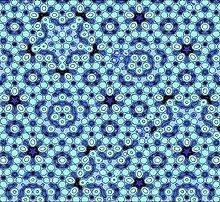“Matter is our World”
(Nobel Laureate in Chemistry Distinguished Prof. Dan Shechtman).
“Do not consider it proof just because it is written
in books…”
Maimonides (attributed)
“His discovery was extremely controversial. In the course of defending his findings, he was asked to leave his research group… However, his battle eventually forced scientists to reconsider their conception of the very nature of matter… Scientists are currently experimenting with using quasicrystals in different products such as frying pans and diesel engines.”
The Nobel Committee at the Royal Swedish Academy of Sciences
Dan Shectman’s discovery of Shechtmanite (Quasicrystals) on April 8th, 1982 changed our understanding of the material world forever. The breakthrough led to the a plethora of new materials and signalled the end of the scientific belief of condensed phase materials concerning symmetry restrictions. Recognition of the new form of matter required personal stamina, thorough proof and the endurance of ridicule on behalf of the scientist.
Shechtman was the first to observe the icosahedral phase in rapidly solidified aluminum transition metal alloys, which opened the field of quasiperiodic crystals as an area of study in materials science. This new form of matter – known as quasicrystals, or Shechtmanite – introduces unique and remarkable crystallographic and physical properties, embodying a novel kind of crystalline order.
Shechtman’s findings demonstrated a clear diffraction pattern with a fivefold symmetry. The pattern was recorded from an aluminum-manganese (Al-Mn) alloy which had been rapidly cooled after melting. Quasicrystals’ structure can be understood through the mathematical theory of tiling.
At the time, most of his colleagues ridiculed Shechtman’s discovery and his paper with Ilan Blech was rejected for publication. In November 1984, Physical Review Letters published Shechtman’s discovery in a scientific paper co-authored with three other scientists: Ilan Blech (Israel), Denis Gratias (France) and John Cahn (USA). Wider acclaim followed, mainly from physicists and mathematicians, and later from crystallographers.
In August 1986, David R. Nelson wrote in Scientific American, “Shechtmanite quasicrystals are no mere curiosity. The study of quasicrystals has tied together two existing branches of theory: the theory of metallic glasses and the mathematical theory of aperiodic tilings. In doing so it has brought new and powerful tools to bear on the study of metallic alloys. Questions about long- and short-range icosahedral order should occupy solid-state physicists and materials scientists for some time to come.”
Today, hundreds of materials are known to exist with the structure that Dan Shechtman discovered. Every year, a number of national and international conferences are held on this subject.
Over 40 scientific books have been dedicated to Shechtmanite, or quasiperiodic crystals, and in many other books, the chapters dealing with crystallography have been updated. In wake of the discovery and its proof, the International Society of Crystallographers has changed its basic definition of a crystal, reducing it to the ability to produce a clear-cut diffraction pattern and acknowledging the possibility of the crystallographic order to be either periodic or aperiodic.
The presence of Distinguised Prof. Dan Shechtman at the Technion Department of Materials Engineering, confirms its role as an international powerhouse of scientific research into the wonders of matter..

